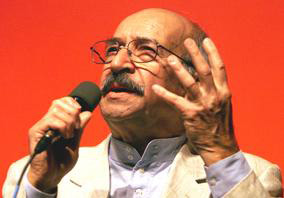 |
 |
 |
 Entertainment | April 2007 Entertainment | April 2007  
The Conscience of Mexican Cinema
 Reed Johnson - LATimes Reed Johnson - LATimes


| | Felipe Cazals helped change Mexican cinema. (LATimes/Lawrence K. Ho) |
Mexico City - A singular Mexican filmmaker has been getting lots of attention here lately. What's shocking is that his name isn't Alfonso Cuaron, Guillermo del Toro or Alejandro Gonzalez Inarritu.

Back in the late 1970s, when the so-called Three Amigos were in high school, director Felipe Cazals was busy pushing cultural hot buttons and flaying cinematic sacred cows. He was part of a group of Young Turks, akin to the Coppola-Scorsese-Spielberg troika, that helped lift Mexican cinema from the slough of institutional mediocrity that had followed its Golden Age of the 1930s through the 1950s.

Along with Arturo Ripstein, Jorge Fons, Jaime Humberto Hermosillo and Paul Leduc, Cazals brought auteur-ship - the French New Wave ideal of the all-powerful, visionary director - to Mexican cinema.

Cazals, who will turn 70 in July, said he remains "very close" to his director brothers-in-arms whose careers took off at the same time as his. Many young Mexican directors such as Del Toro, whose "Pan's Labyrinth" won three Oscars this year, have acknowledged a debt to Cazals' generation of free-thinking, self-reliant filmmakers.

"We formed ourselves in the conception that the cinema that we wanted to make had to see the Mexican reality that we were living every day," said Cazals, who also has produced and written films and occasionally acted.

In keeping with this philosophy, Cazals said, he and many of his contemporaries chose to resist Hollywood's siren song and stay in Mexico, drawing artistic sustenance from the country's rich culture while not shrinking from its problems and failings. That viewpoint continues to animate his work. "Mexico has 110 million inhabitants; 42 million don't eat two meals a day," he said. "So my place is being here."

Cazals crafted thoughtful, bleakly humorous allegories about political repression and probing quasi-documentaries about corruption, sexual slavery and social decay. He helped to liberate Mexican cinema from the stereotypes of charros (picturesque cowboys) and guys in sombreros dozing against cactuses. And by turning a klieg light on shadowy corners of the national psyche, he encouraged Mexicans to face their dark side.

Not an easy task, either then or now, said Jose Antonio Valdes Pena, a film analyst at the Cineteca Nacional, Mexico's national film theater. "The great problem that we have in our country is that we don't grasp the past," he said. "It's a country that's always beginning at zero."

Time seems to have validated Cazals, who was born in France to Spanish parents exiled after the Spanish Civil War and raised in Mexico's Jalisco state before his family settled in the nation's capital. Today, he is still filling the role of artistic conscience, as a recent retrospective of his work here demonstrated.

A packed auditorium at the Cineteca Nacional watched a screening of Cazals' harrowing "Las Poquianchis," based on a notorious true incident in Guanajuato state in which young women were pressed into prostitution, brutally abused and murdered. The movie, whose title refers to the sisters who ran the prostitution ring, is part of a trilogy that includes "El Apando" (The Heist) and "Canoa," widely regarded as the director's masterpiece. All three movies were released in 1976.

The retrospective was in honor of Cazals receiving Cineteca's Salvador Toscano Medal, named for a Mexican film pioneer and regarded as the country's highest cinematic honor.

Leonardo Garcia Tsao, Cineteca's director, told the audience that a constant thread of Cazals' movies is using the past to illuminate the present. When "Canoa" premiered in Mexico, Tsao said, "You sensed a change in Mexican cinema."

That film, a kind of fictional documentary based on real events, tells of a group of students whose trip to the small Mexican town of San Miguel Canoa ends in mob violence when a local priest accuses them of being communist agent-provocateurs.

It's generally been interpreted as an allegory of the Tlatelolco massacre on Oct. 2, 1968, when police and federal agents reportedly slaughtered hundreds of protesters a few days before Mexico began holding the Summer Olympics. "Nothing like it had been seen before," Tsao said of "Canoa."

The same could be said of "Las Poquianchis," which opens with a scene of reporters flocking to an exhumation of maggot-infested bodies in a rural pueblito. This spectacle, simultaneously horrifying and grotesquely funny, sets the tone for the story of a prostitution ring in which nearly the entire town is implicated, and the line between victims and victimizers grows disturbingly blurred.

Although his movies never recoiled from splattered blood, Cazals always has been more interested in the moral dimension of violence than in the act itself. But even in his most critical mode, Cazals never lost touch with his subjects' humanity or his own macabre wit, Valdes Pena said.

Cazals speaks favorably of younger colleagues such as Cuaron ("Y tu mama tambien," "Children of Men") and Del Toro, whose films have brought global attention to Mexican cinema in the past half a dozen years.

And he believes it's a good time to be a Mexican filmmaker, because for the first time in a while, he said, the nation's cultural institutions are "in the hands of people that understand perfectly what is Mexican cinema." He has two movie projects in the works, one of which addresses terminal illness.

Sounds dispiriting? Not for this filmmaker. "I'm an incurable optimist," he said, "because I believe what always has permitted Mexico to go onward is this cultural force, at times in open rebellion, or in constant rebellion, which is what makes the arc of the arrow go forward." | 
 | |
 |



